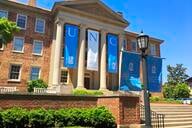You have /5 articles left.
Sign up for a free account or log in.
The second try was the trick for Ashford University, which earned its regional accreditation from the Western Association of Schools and Colleges after being rejected one year ago.
Ashford, a for-profit institution with a heavy online focus, was successful in proving that it had made sufficient progress in fixing a range of problems identified by the the association, including a lack of full-time faculty members, large numbers of students who drop out and questionable academic rigor in some areas.
Bridgepoint Education Inc., the university’s publicly traded holding company, announced the news in a corporate filing on Wednesday. Its share price jumped 26 percent.
The most recent Western Association review involved multiple site visits during the last year.
“The team found an institution that has been fundamentally transformed and whose culture has been changed in significant ways,” the team's report said, according to a Bridgepoint news release, “including a shift from a market driven approach to an institution committed to student retention and success, a transformation that is enthusiastically supported by the Board of Trustees, the new President, administration, faculty and staff.”
Ashford had sought to move its accreditation from the Higher Learning Commission of the North Central Association of Colleges and Schools. That regional accreditor came under fire for giving its imprimatur to Ashford, most notably during a 2011 Congressional hearing hosted by Sen. Tom Harkin, an Iowa Democrat and frequent critic of higher education.
The commission later ruled that Ashford would need to move a significant portion of its physical operations to the 19-state area the commission oversees. Bridgepoint is based in California, which is in the Western Association’s territory.
Another key concern about the university, for both Harkin and accreditors, was its rapid growth. Ashford’s enrollment reached 95,000 last year after being 10,000 just five years earlier, and critics held it up as the primary symbol of the go-go growth of for-profit higher education. When Ashford looked to move to the Western region, some observers saw its decision as a form of accreditation shopping.
The Western Association, in its previous review, criticized Ashford on multiple fronts for growing aggressively and not being able to keep up with that expansion. But the accreditor also praised the university in some areas, saying faculty members and administrators were committed to keeping Ashford affordable and accessible.
The university’s enrollment has taken a serious hit since news of its accreditation woes surfaced last year. It had sunk to 79,000 by March, Bridgepoint executives said in an earnings call with investors.
Ashord made a number of changes over the last year, some of them painful. In September it eliminated 450 jobs in admissions and reassigned another 400 admissions employees. Last month Ashford announced a voluntary buyout program, and said it had laid off all teaching assistants while hiring more full-time faculty members. The company reported that Ashford had made $85 million in recurring annual cuts.
The university also hired two leaders from traditional higher education. Richard Pattenaude, Ashford’s president, previously led the University of Maine System. And Gregory L. Geoffroy, chairman of the university’s governing board, is the former president of Iowa State University.
Ashford’s two new leaders predicted in December that the university would make the changes needed to win over accreditors. They were right, apparently.
The company’s announcement is likely to anger many supporters of City College of San Francisco, which learned last week that it will lose its accreditation in a year. City College’s regional accreditor is the Accrediting Commission for Community and Junior Colleges, which is the two-year college arm of the Western Association. The commission, however, recently moved to become more independent from the Western Association.
National faculty union leaders have already criticized accreditors for allegedly being harsher on City College than on for-profits.
For Bridgepoint, however, the Western Association’s was a recognition of Ashford’s work since last year. The association will release its full report on the review soon.
“We appreciate WASC's recognition of Ashford University's efforts,” the company said in a written statement, “and know that those same efforts will benefit our students through both the ongoing and new initiatives Ashford has implemented throughout this process.”




